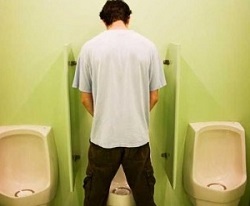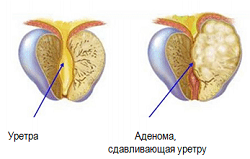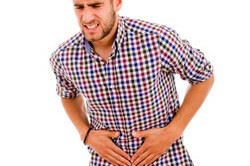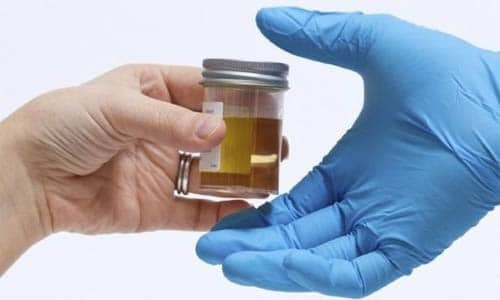If the period between acts of urination is less than two hours, subject to the usual drinking regimen( up to 3 liters / day), then men are diagnosed with frequent urination. Some experts consider this act to be frequent during urge more often at night. Such disorders of urination lead to sleep disorders, increased nervousness and irritability of men. If the patient drinks a lot of liquid, then a similar deviation is considered the norm, but in this case, as much liquid as was drunk should be allocated. When the daily drinking regimen is observed, and urine is allocated significantly more than drunk, polyuria develops, which is often accompanied by painful urination, and a feeling of incomplete devastation of the bladder.

The nature of the urethra is quite simple. The desire to visit the toilet room appears with irritation of the nerve receptors of the urethra and cervix located in the bladder. Receptor endings, located on the mucosa, instantly recognize the increase in the bladder and report it to the brain centers responsible for urethra. When the urinary system is inhibited by inflammatory processes, the receptors give false signals, which leads to a forced contraction of the musculature and the appearance of an urinary urge.
Clinic of frequent urination in men
Usually frequent urination is not manifested in its pure form, but occurs in combination with symptoms like:
- Itching sensation in the groin and perineum;
- Painful urge and the process of emptying the bladder;
- Urine begins to smell unpleasant and changes the shade;
- Burning with urination;
- The presence of foreign impurities in the urine like purulent or bloody clots.
Possible causes of deviation
 Usually, urination is accelerated by a number of infectious factors that promote irritation of the urinary tract and lead to increased urge to go to the toilet. If therapeutic actions are not taken on time, an irreversible defeat of the genitourinary system is possible. In some cases, even qualitative treatment of neglected pathology can not completely restore urogenital functions. As a result, there are many pathological abnormalities in the prostate, kidney, urethra. Most often provoke such urogenital disorder various diseases.
Usually, urination is accelerated by a number of infectious factors that promote irritation of the urinary tract and lead to increased urge to go to the toilet. If therapeutic actions are not taken on time, an irreversible defeat of the genitourinary system is possible. In some cases, even qualitative treatment of neglected pathology can not completely restore urogenital functions. As a result, there are many pathological abnormalities in the prostate, kidney, urethra. Most often provoke such urogenital disorder various diseases.
Urethritis
These are inflammatory processes that occur on the walls of the urethra. The disease is transmitted through sexual contact with an infected partner. Usually accompanied by pain, cut, burning and discharge. If the causative agent of the disease are bacteria, the secretions acquire a purulent-mucous nature and an unpleasant odor. One of the first signs of developing urethritis is frequent urination.
Prostatitis
Inflammatory lesions of the prostate gland give men a lot of inconveniences, including frequent urination accompanied by painful sensations. Along with them, a man often experiences pain in the scrotum and perineum, notices the appearance of some sexual disorders like lack of an erection in the morning and its weakening at other times.
Caution! Prostatitis requires immediate treatment, since it contributes to worsening of the genital circulation, which negatively affects the maturation of spermatozoa.
Prostate adenoma
 It is considered the most common cause of frequent urination. A similar pathology affects men over the age of 50. With the development of adenoma from the glandular tissue grows tumor-like formation. It does not belong to the group of malignant tumors, but it also brings a lot of problems. The growing adenoma blocks the urinary tract, which makes urine flow difficult. As a result, the bladder is deprived of the ability to completely empty. The time of its filling is reduced and the desire to go to the toilet is increasing.
It is considered the most common cause of frequent urination. A similar pathology affects men over the age of 50. With the development of adenoma from the glandular tissue grows tumor-like formation. It does not belong to the group of malignant tumors, but it also brings a lot of problems. The growing adenoma blocks the urinary tract, which makes urine flow difficult. As a result, the bladder is deprived of the ability to completely empty. The time of its filling is reduced and the desire to go to the toilet is increasing.
Hyperactive Bladder
This pathological condition is characterized by frequent, sudden and very strong urges, up to incontinence. Rapid urination, provoked by a hyperactive bladder, worries a man even at night. The frequency of urges in this case is explained by the constant tone and tension of the musculature of the bladder responsible for the urine flow. For such a disease is characterized by the absence of pathological deviations of the results of the analyzes. The causes of hyperactivity are usually caused by spinal cord injuries.
Urinary incontinence
Usually, such a pathological condition is characterized by an involuntary outflow of a small amount of urine when sneezing or laughing, coughing, etc. Incontinence usually develops against neurological disorders.
Pyelonephritis
Inflammatory processes of the kidney tissues also contribute to urinary disorders and are often manifested by frequent urination. Pyelonephritis is usually accompanied by fever, soreness in the affected kidney, general malaise.
Cystitis
 Inflammatory processes that occur on the walls of the bladder, lead to their irritation, there is a response of the receptors and there is an urinary urge. For cystitis, the increased frequency of emptying the bladder is considered the main symptom, and the volume of urine released is significantly reduced. Along with frequent urination in the toilet, a man may experience some difficulties in the process of bladder emptying, right up to the pain. In urine with cystitis, foreign impurities of bloody or mucous nature are often found, and urine itself acquires an unpleasant sharp odor.
Inflammatory processes that occur on the walls of the bladder, lead to their irritation, there is a response of the receptors and there is an urinary urge. For cystitis, the increased frequency of emptying the bladder is considered the main symptom, and the volume of urine released is significantly reduced. Along with frequent urination in the toilet, a man may experience some difficulties in the process of bladder emptying, right up to the pain. In urine with cystitis, foreign impurities of bloody or mucous nature are often found, and urine itself acquires an unpleasant sharp odor.
Diabetes mellitus
The high content of glucose in the blood also helps irritate the receptors and increase urge to urinate, along with which a man can experience a constant thirst, fatigue, weight loss and irritability.
Urolithiasis
Urolithiasis is characterized by the formation of stones in the organs of the urinary system. Concrements can be characterized by different composition, size or weight. This pathology, in addition to frequent visits to the toilet, is accompanied by lumbar pains, bloody impurities in urine, increased blood pressure and overall temperature, a feeling of pain and interruption of the jet in the bladder emptying. Concrements( sand, pebbles, etc.) irritate the mucous membranes of the urinary tract, which causes frequent urination.
Urinary tract stricturesThis is a pathological narrowing of the urethral lumen, which can be detected already at birth, or acquired later. Such a disease is usually accompanied by difficulties and urination with a weakening of the jet.
Reactive arthropathy
This pathology belongs to the category of autoimmune and develops against a background of sexual infections like chlamydia or mycoplasmosis. As a result, joint damage occurs, and urethritis develops, which provokes frequent visits to the toilet.
Specificity of food
If a man abuses dishes with spicy or spicy condiments, as well as meat food, this leads to a change in the acid balance of urine. Excessively acid urine causes irritation of the membranes lining the bladder, which turns into a frequent urination. Provoke a quickened visit to the toilet room can also be drinks like green tea, coffee or alcohol.
Iron deficiency anemia
In rare cases, the frequency of emptying the bladder is disrupted due to acute iron deficiency in the body. Mucous tissues of the bladder on the background of IDA are thinned and easily irritated, causing desires.
Age characteristics of the body also have significance, because to the old age the whole body's muscles lose their tonus, the bladder too, which is why the urination increases more rapidly.
Remedies for
Because there are many reasons for the development of such a violation,.Violation of the frequency of trips to the toilet is not one of independent pathologies, but is considered by specialists as a clinical sign of a disease. After the detection of the underlying disease and appropriate therapy is prescribed.
With a diabetic etiology of frequent urges, glucose levels need to be normalized. If the cause is hidden in the kidney infection - treatment implies a course of antibiotic therapy. Hyperactivity of the bladder is eliminated by anticholinergic drugs that are dispensed strictly by prescription.
Important! If the cause of the increase in urinary desires is such pathologies as prostatitis, urolithiasis, insufficiency of kidney function or adenoma, the intervention of doctors is extremely necessary.
The urinary nature of the disease is usually eliminated by a surgical intervention involving the crushing of stones or their removal. Adenoma of the prostate is usually treated by the method of transurethral excision or it is removed with open surgery.
To improve the effectiveness of therapeutic measures, a properly selected diet, involving the exclusion of products that irritate the bladder, can be used. To such products doctors include chocolate, caffeine, artificial sweeteners, diuretic teas and alcohol.



